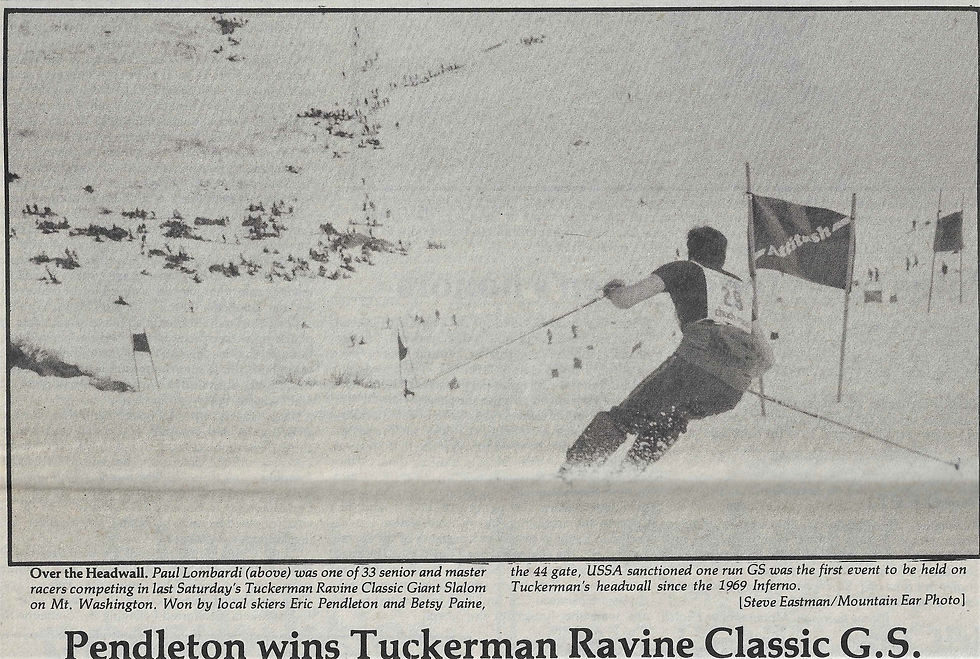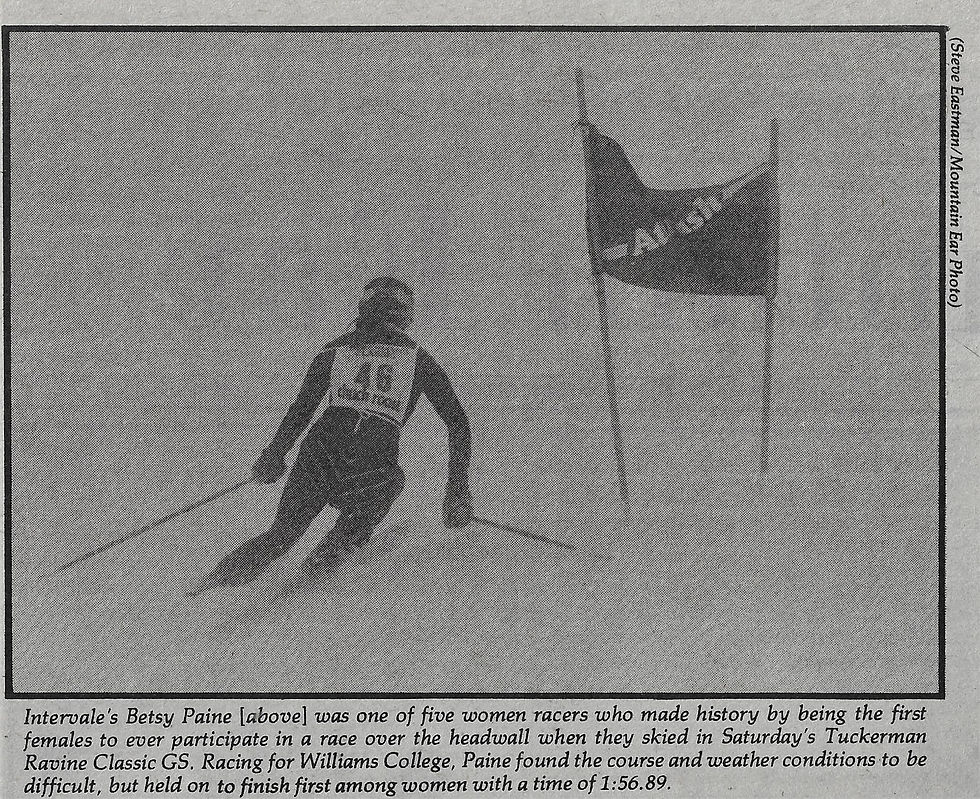Pendleton wins Tuckerman Ravine Classic G.S.
- by Tom Eastman
- Apr 20, 1984
- 6 min read
Updated: Aug 9, 2025
The great spirit of local Indian lore, Agiochook, must have gazed down from his throne atop Mt. Washington to Tuckerman Ravine Saturday, and smiled. The rain forecasted for the day held off, and for the first time in 15 years, a bona fide ski race was held on the ravine's tradition-steeped headwall. Best of all, two area skiers -- Eric Pendleton, 26, of Jackson, and Betsy Paine, 21, of Intervale -- assured their place in local ski racing history by winning the USSA sanctioned, 44-gate one-run giant slalom.

The work of 100 volunteers, the 1984 Tuckerman Classic GS was nearly a victim of inclement weather. While race conditions were said to be excellent when inspected by race committee officials earlier in the week, the ravine was socked in by fog Saturday morning, with even worse weather predicted for the back-up days of April 15-16. Chief of Course Sheldon Perry and Chief of Race Chris McAleer consequently came to one conclusion Saturday morning: It was either now or never, period. Having been foiled by the weather in their previous attempt to hold a race on Mt. Washington in 1982, neither cherished the idea of postponing history a second time.
Perry, with his characteristic optimism, was confident the clouds would lift in time for the start of the race at noon. "It's clear on the other side of the mountain," Perry cheerily announced upon greeting other race committee officials at the Appalachian Mountain Club's Pinkham Notch Camp at 6:30 a.m. "We've got a good chance."
Miracle of miracles, the skies, which at 5:00 a.m. Saturday had looked like rain, brightened as the morning progressed. Perry, McAleer, and Chief of Safety Al Risch conferred and broadcast their decision at 7:15 over local radio WMWV/WBNC: The race was on.

Shortly thereafter, snowcats loaned by Wildcat and Attitash set off for the ravine, carrying race officials and equipment. Meanwhile, 33 of the total field of 53 racers who had registered for the event left Pinkham Notch for the 2.5-mile hike to the headwall. Race officials attributed the smaller turnout to the poor weather, if not a lack of faith.
Mindful of the forecast, Perry and McAleer moved the race's scheduled 12 noon start slightly ahead in an effort to beat the rain. As the crowd of 600 spectators took their places around Lunch Rocks, six forerunners left the start and bombed through the first 20 gates, breaking in the course. Initially crossing the southeast snowfields, the forerunners next hit the difficult mid-section. Extending from Tuckerman Junction, where there was a sharp dog-leg turn to the left, and then down to the precipitous lip, the mid-section was expected to be the most difficult segment of the course. From there, the course dropped down over the headwall for the final 14 gates to the finish on the floor of the ravine. The entire trip was expected to take anywhere between 1:30 and 1:40 for the best racers, and somewhat longer for the others.
Skiing for the Wildcat Mountain Ski Club, Jackson's Eric Pendleton was the first competitor to leave the gate. Originally slated to be a forerunner, the 5'7" Jackson racer decided to race when the draw was chosen the night before. It proved to be one of the better decisions the former Peugeot Eastern Grand Prix Tour racer ever made.

Pendleton began his descent into ski history at 11:41, becoming the first officially sanctioned racer to make his way over the headwall since the 1969 Inferno. Knowing the fastest skier on the upper part of the course would most likely win the event, Pendleton skied aggressively through the first 20 gates but encountered trouble in soft snow at the Tuckerman Junction turn. "I ran into some deep soft snow there and had to pole my way out of it to get going again," he noted. Thinking that there was no way he could win the race after the error, Eric concentrated on his goal for the rest of the course -- finishing.
Coming off the lip, Pendleton found the descent through the final 14 gates to be relatively easy going, analogous to "free skiing." "The final 14 gates were pretty much like turns across the hill. I was going so slow, I felt like I was almost stopping," he said. Noting he's skied over the lip every spring for the past 15 years (even getting caught in an avalanche two years ago), Pendleton said he's been scared every time except during Saturday's race. "All you had to do was follow the gates. Wasn't scary at all," he recalled.
More difficult for Pendleton was gauging the snow surface under his skis. "The snow was slushy and deep, catching your tips and throwing you off balance," he explained. The fog limited his vision to two gates ahead as well, making the course tough. "Instead of linking turns, I put together a succession of recoveries," he later laughed.
Pendleton crossed the finish line to a round of applause from the spectators perched on Lunch Rocks, thinking that his time of 1:24.77 would never be fast enough to win. Joining the spectators on the sidelines, he sat back, intent only on enjoying the rest of the day watching his fellow competitors.
Many racers who followed Pendleton crashed, missed gates and generally found the course tough going, Having better luck, though, were the 6th and 17th racers, Luc Laliberte and Raymond Hotte of Mt. Tremblant, Quebec. Skiing buddies who spend at least a week skiing Tuck's every spring, the Canadians put in times of 1:27.75 and 1:28.75, and were followed by race chairman Chris McAleer, who finished fourth in 1:33.27.
Much to his surprise, Pendleton was declared the winner. "Someone told me I'd won, and I couldn't believe it," he said. When announcer Peter "Pigge" Case confirmed Pendleton as the winner over the loudspeakers, he started believing it. "Someone had to win, and although I didn't think it'd be me," he said, "I'm honored." Sharing Pendleton's sentiments and sense of accomplishment was Williams College junior Betsy Paine, who -- along with four other women entered in the event -- made history by being the first to ever participate in a race over the headwall. Finishing with a time of 1:56.89, Paine's victory also represented a determined comeback for the Intervale resident.
Stricken by a rare neurological virus last spring, Paine spent most of the summer in bed, resting. Walking with crutches by August, she bucked the skeptics and returned to school in the fall where she worked out and learned how to walk and run all over again. Remarkably, she regained her spot on the school's ski team when the season began this past winter.
After finishing 25th in the collegiate rankings (only the top 20 were invited to the NCAA championships), Paine termed the season one of frustration. "It's been a tough year for me, as I haven't been as strong as before. It seemed like I was trying as hard as I could just to stay even."
Racing 22nd in the field Saturday, Paine left her year of troubles behind by beating her closest woman competitor by the substantial margin of 18 seconds. Swinging below a gate at the top of the headwall, Paine thought she had blown the race when she had to stop and climb back up to the gate to ski through it. Moving smoothly down the rest of the course, she held on to win, raising her arms in triumph as she crossed the finish line.
As she noted, the win served as a symbolic end to a trying year in her life. "Finishing first like this is a real pick-up for me after everything that's happened. It's been a long year; a really long year," she said, "and this win means to me that it's finally over. Now it's time to get on with the rest of my life."

Like the Boston Marathon, the Tuckerman Classic left other stories to tell which -- like Paine's —represented triumphs for those who participated. There was Fran Lathrop, who at age 62 was the race's oldest participant. Adding an international flair to the event were the enthusiastic Canadians; Laliberte and Hotte. After attending Saturday night's awards ceremony in Jackson, they set out for Tuckerman Ravine in the rain, just so they could get off to an early start on the headwall the next morning. "We really like this place," Luc said.
Also worthy of note was local skier Bob Bean's spectacular fall. Crashing through the snow fence at the top of the lip, Beanie slid down to Lunch Rocks -- a distance of 400 vertical feet. He lived to tell about it and was back tending bar at the Red Parka Pub in Glen Saturday night. Equally remarkable was a new wireless timing system used in Saturday's race for the first time, while also noteworthy was the fact that only.20 of the 33 racers were able to finish the course.
Most of all, there was the story of cooperation and volunteerism that made the whole event possible. As
Chief of Race McAleer noted, "Many people were willing to put in a lot of work just to be part of this, and we owe them an awful lot of thanks." The reasons behind the race committee's efforts were best summed up by Chief of Course Perry, who raced in the last race held on Mt. Washington in 1969. "Why do we do this? Because we love the mountain, and this is a way to be involved with it," Perry said. "It's the kind of thing you do because it's exciting, possible, and above all, a challenge worth attempting."

Comments